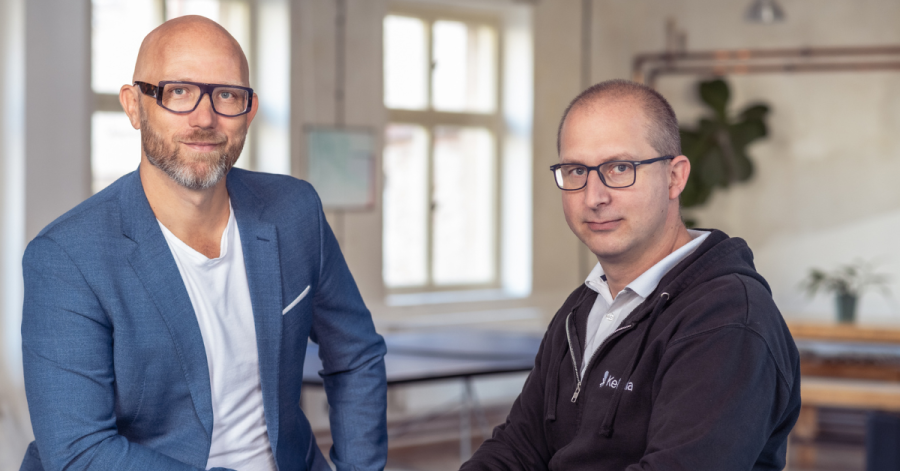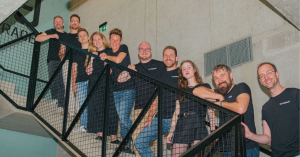If you only have a minute, here are three key takeaways:
- Czech-founded Keboola, a self-service data operations platform, has raised $32М in a Series A funding round, led by the private equity business of Viking Global Investors.
- The investment will fuel their expansion in Europe, the UK, and the USA.
- In the interview for The Recursive, Pavel Doležal, Keboola’s CEO, talked about why it is important to put product development above funding.
Czech-founded Keboola, a self-service data operations platform, recently raised $32 million in a Series A funding round, led by the private equity business of Viking Global Investors. Keboola’s mission is to connect and integrate all company data in one end-to-end Data Stack as a Service. This new approach to the Data Stack puts customers in full control of their data with a single platform.
The significant funding builds on 2022’s $4.5 million Seed round led by Presto Ventures with participation from Reflex Capital, TCF Capital, Eduard Kučera, and other angel investors. As of November 2023, the $32M investment marks the biggest Series A round in the CE (Central Europe) region in 2023.
“This investment will help Keboola accelerate our strategic growth as we expand in the European and the UK markets and position for US expansion in 2024,” says Pavel Dolezal, Keboola’s CEO. “We have been gratified by the feedback we’ve received from our clients who feel they now have full control of their data and processes in ways they didn’t before, and have been encouraged that many customers have found Keboola useful across business AI initiatives, which we expect to continue to drive demand for our platform.”
To learn more about how it is to raise a significant round in the current economic context, but also how to build a great product, The Recursive interviewed Pavel Doležal, Keboola’s CEO.
The Recursive: Could you share a brief overview of your entrepreneurial journey?
Pavel Doležal: My first venture was around 12 years old. My uncle had a factory for wooden toys, and I helped him build and sell toys at the Christmas market in Prague. It was around 1988 or 1989, and that’s when I first learned how to attract a crowd, start selling, and build something that gives value. I realized you need to have a story, a service around the product because people don’t just buy the product, they buy the whole story, the intention behind it.
In the world of technology, I started as an exchange student in Las Vegas in ’94, where I first encountered the internet. This was before the World Wide Web became widespread, and there was Gopher, Telnet, and Veronica (technologies in the early internet ecosystem-ed.note). I knew something big was coming.
When I came back, the internet was nowhere to be found in the Czech Republic. I went to college and after a year and a half, I started a Dev Shop with my friends in ’97-’98. Then we ran a portal network called Atlas, becoming the largest portal network in Europe, spanning Czech, Slovak, and Ukraine. We sold that venture to Warburg Pincus. It was a transformative journey as we transitioned people from the analog to the digital world, involving machine learning, search, and building everything from scratch.
Later, I started a company called Ataxo, which within 18 months became one of the largest performance media marketing companies globally. We served 15,000 clients in the first year, thanks to a change in go-to-market strategy and automation using machine learning. We used machine learning for everything, including scraping websites, SEO, connected keywords, Bayesian techniques, and campaign automation. We were running 15,000 campaigns for 15,000 companies with just 15 people, showcasing significant scale.
I then moved into investments for a couple of years, but I quickly realized that I prefer building. Despite the exposure to various ideas and clever people, seeing daily product growth was more fulfilling for me. Through one of my investments in a company which is now called Revology, the largest Google partner in Central Eastern Europe, I connected with Petr Šimeček, my co-founder, and we began brainstorming around new business ideas.
Tell us more about how Keboola started and what it does today?
The company which we folded into Keboola was founded back in 2007, when my co-founders Petr Šimeček and Milan Veverka started an agency. They did cloud migrations and saw that the biggest hurdle was analyzing and accessing data. I met with them in 2015 and we all had a passion for solving data problems and helping people democratize data access.
Having built several data and machine learning-based companies before, I saw the need for a change in how data analysis works. So, after I sold my last company we got together and started brainstorming about where the data world is going in the next 10 years.
We saw that the world is moving to be algorithm-driven. If you look at trading on the stock exchange, it’s all algorithmic. When you look at our TV, it’s all algorithmic. The cloud enabled many to do new workloads, and people in business wanted to analyze data. But they didn’t have the skills or the technical people. At the same time, there were new tools around Snowflake and modern data stacks. We thought that these solutions are not going to enable people in business to analyze data, use machine learning models, and automate processes so we needed to change how it works. We took inspiration from the PC world where you have a hard drive and other direct peripherals, but you cannot work with them individually. That’s why people created operating systems. Our plan was to create an abstraction layer, and our computer is the whole cloud, no matter if it’s Google, AWS, or Azure. Users don’t want to use different things. They want to use simple servers that make all that happen. We tested this vision for a year, did initial programming, and took things from the agency. We said, ‘Hey, this is really big, and we should devote our lives to it for the next 20 years.’ So, in 2017, we started what is now Keboola Industries, our product
company.
If you look in the online world, we have Google Analytics. So you can measure everything on your website using Google Analytics, you know who came when, what they did. Imagine that something like that would exist for the offline world, so every interaction could be measured. That’s how we started to build our platform so anybody can use it. Nowadays, we have large banks using it in 37 departments without the help of IT. With Keboola, hundreds of people in the banks do their own persona 360, HR processes or even the composable CDP. Also other companies like Rohlik Group, Publicis Groupe, Deloitte, Erste Group, BNP Paribas, or Allegro use Keboola.
How did you come up with this name Keboola?
That’s a good one. One of the hardest things for tech people is, how do you come up with the name and free domain. What we’ve done was to actually use a random names generator and cross-check with the free domains. Out of those, one name stood out, and it was Keboola. It was also because it’s a play on the word – in Czech it means <big head>. As we work in AI automation of cognitive processes and data, a big head is handy. Then it immediately led to the idea of the octopus, our logo.
How many people do you have in your team currently, and how are you looking at the team in terms of expansion?
I was sending a Slack message about the Christmas party, which we always do after Christmas because nobody said that the Christmas party has to be before Christmas. I mentioned all the people and there are 89 as of today. Also we have about 15-20 people starting in January and we are looking to double the team within the next 12 to 18 months.
Currently we have people all over the world. The engineering team is very much centered around Czechoslovakia, most of them within three hours of driving distance. It gives us a lot of opportunities to meet many times a year. We have a big cohort of people in Prague and they go to the office most of the days. Other than that, we have people in London, Vancouver, Philadelphia, Seattle, San Francisco, Spain, Portugal.
We plan to hire most of the people in London and for the next two quarters, it will be more UK and Germany. In the second half of next year – in Boston and New York.
What was your experience with the fundraising for Keboola?
We were bootstrapped until €5M ARR. After the pandemic, when everyone understood they needed digitalization and the market was going our way, we took the angel round last year. Because we have never been externally financed and didn’t know what it means, we called upon our core users, core clients like Eduard Kucera, Presto Ventures and others. All those people have one thing in common. All of them built very successful businesses using Keboola, so they invested in us.
We are not coming from MIT, Google, or Facebook, but we believe we have a better story. People built billion-dollar businesses using Keboola. And then the same people invested as angels into the platform and kept growing with us. We then almost doubled the revenue, and we saw that it’s going in the right direction.
When the Viking Global Investors reached out to us, we didn’t know exactly if we wanted this. After talking with more VCs and deciding on what we need, we took the Series A round.
How is it to be active in the USA as a European data company?
I have to say that starting in the European Union, especially with the data, our product has turned out to be a great advantage overseas. Because, by default, we had to be very compliant, very secure, and governed, because of the GDPR and all of the other regulations. All of that helped us when we went overseas. When we win a client in the US, it’s usually exactly around the governance, around all the people being governed through an active directory in anything they do. In many cases, within the banks, we are literally the only cloud system that can have all of the security. In our case, it’s been a blessing to start in Europe.








